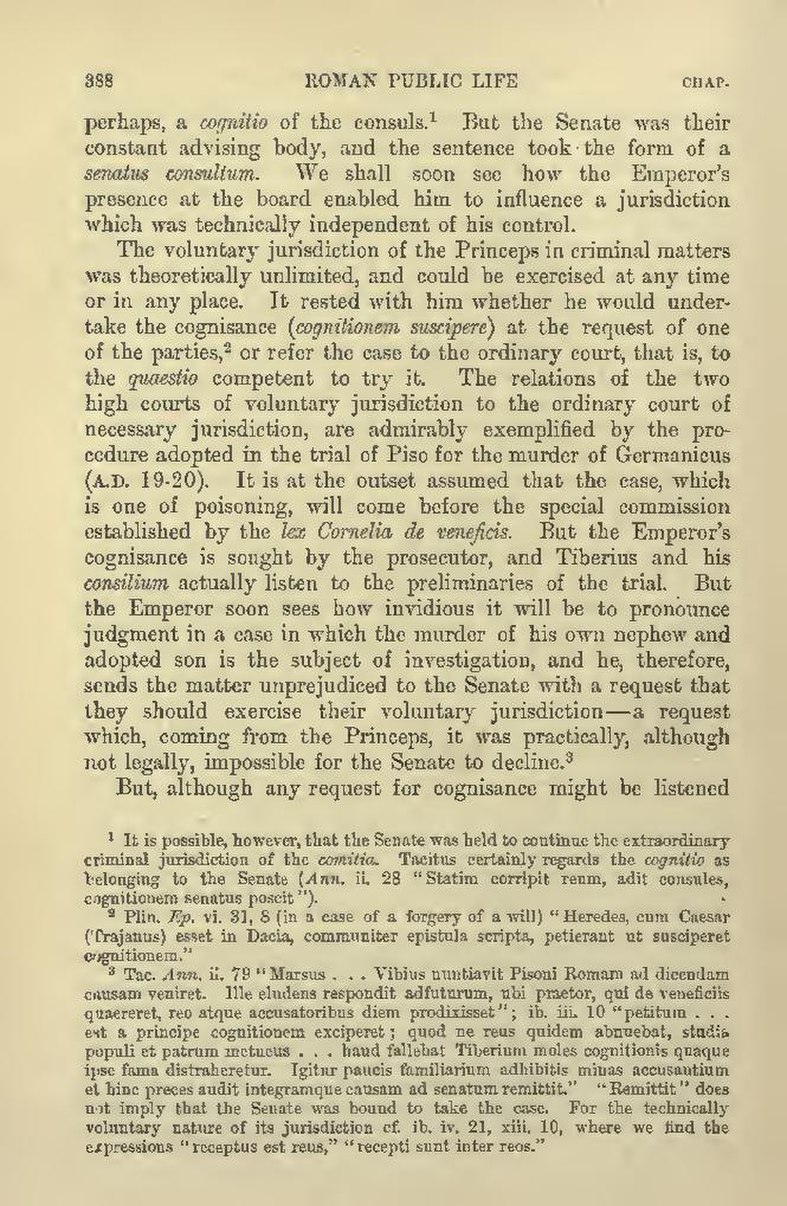perhaps, a cognitio of the consuls.[1] But the Senate was their constant advising body, and the sentence took the form of a senatus consultum. We shall soon see how the Emperor's presence at the board enabled him to influence a jurisdiction which was technically independent of his control.
The voluntary jurisdiction of the Princeps in criminal matters was theoretically unlimited, and could be exercised at any time or in any place. It rested with him whether he would undertake the cognisance (cognitionem suscipere) at the request of one of the parties,[2] or refer the case to the ordinary courts that is, to the quaestio competent to try it. The relations of the two high courts of voluntary jurisdiction to the ordinary court of necessary jurisdiction, are admirably exemplified by the procedure adopted in the trial of Piso for the murder of Germanicus (A.D. 19-20). It is at the outset assumed that the case, which is one of poisoning, will come before the special commission established by the lex Cornelia de veneficis. But the Emperor's cognisance is sought by the prosecutor, and Tiberius and his consilium actually listen to the preliminaries of the trial. But the Emperor soon sees how invidious it will be to pronounce judgment in a case in which the murder of his own nephew and adopted son is the subject of investigation, and he, therefore, sends the matter unprejudiced to the Senate with a request that they should exercise their voluntary jurisdiction—a request which, coming from the Princeps, it was practically, although not legally, impossible for the Senate to decline.[3]
But, although any request for cognisance might be listened
- ↑ It is possible, however, that the Senate was held to continue the extraordinary criminal jurisdiction of the comitia. Tacitus certainly regards the cognitio as belonging to the Senate (Ann. ii. 28 "Statim corripit reum, adit consules, cognitionem senatus poscit").
- ↑ Plin. Ep. vi. 31, 8 (in a case of a forgery of a will) "Heredes, cum Caesar (Trajanus) esset in Dacia, communiter epistula scripta, petierant ut susciperet cognitionem."
- ↑ Tac. Ann. ii. 79 "Marsus . . . Vibius nuntiavit Pisoni Romam ad dicendam causam veniret. Ille eludens respondit adfuturum, ubi praetor, qui de veneficiis quaereret, reo atque accusatoribus diem prodixisset"; ib. iii 10 "petitum . . . est a principe cognitionem exciperet; quod ne reus quidem abnuebat, studia populi et patrum metuens . . . haud fallebat Tiberium moles cognitionis quaque ipse fama distraheretur. Igitur paucis familiarium adhibitis minas accusantium et hinc preces audit integramque causam ad senatum remittit." "Remittit" does not imply that the Senate was bound to take the case. For the technically voluntary nature of its jurisdiction cf. ib. iv. 21, xiii. 10, where we find the expressions "receptus est reus," "recepti sunt inter reos."
